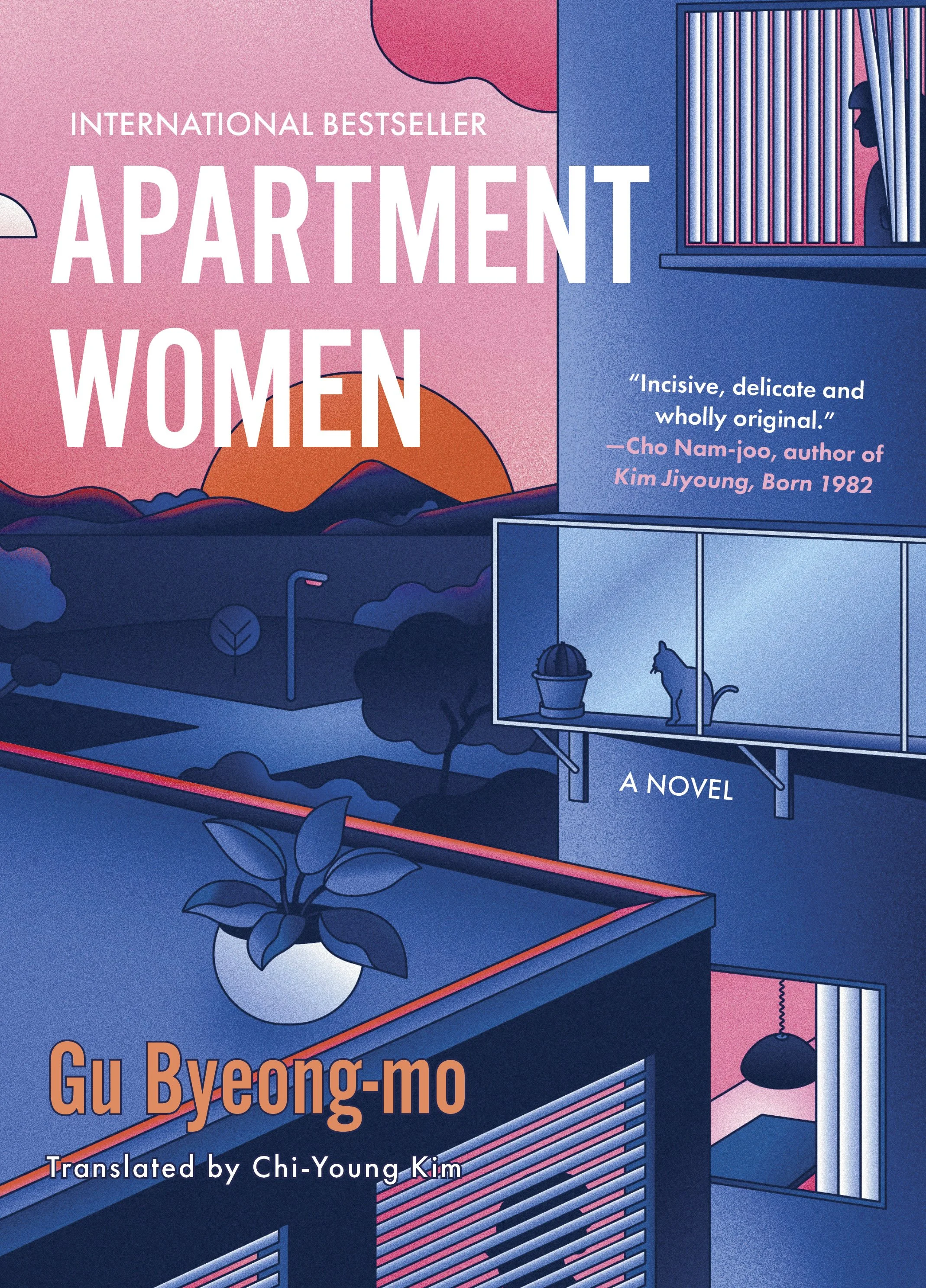Publication Date: December 3, 2024
Publisher: Hanover Square Press
From the New York Times Notable author of The Old Woman with the Knife, comes a bracingly original story of family, marriage, the cultural expectations of motherhood, about four women whose lives intersect in dramatic and unexpected ways at a government-run apartment complex outside Seoul
When Yojin moves with her husband and daughter into the Dream Future Pilot Communal Apartments, she’s ready for a fresh start. Located on the outskirts of Seoul, the experimental community is a government initiative designed to boost the national birth rate. Like her neighbors, Yojin has agreed to have at least two more children over the next ten years.
Yet, from the day she arrives, Yojin feels uneasy about the community spirit thrust upon her. Her concerns grow as communal child care begins and the other parents begin to show their true colors. Apartment Women traces the lives of four women in the apartments, all with different aspirations and beliefs. Will they find a way to live peacefully? Or are the cultural expectations around parenthood stacked against them from the start?
A trenchant social novel from an award-winning author, Apartment Women incisively illuminates the unspoken imbalance of women’s parenting labor, challenging the age-old assumption that “it takes a village” to raise a child.
Excerpt
The recycling truck kicked up pieces of cardboard and dust as it drove off. Soda cans and bottle caps that had fallen off the back tumbled along the ground. Danhui’s hands became sticky as she picked up the trash and put it in the sack.
After she cleaned up the recycling, she broomed the dust into a metal dustpan, dumped it into a trash bag, and headed up to the third floor. She could hear the baby’s cries from the bottom of the stairs.
“Hyonae-ssi, are you there? Hyonae-ssi? Sounds like Darim’s crying?”
She heard rustling as the crying settled, then the front door swung open. Exhausted, her eyes bloodshot, Jo Hyonae came outside holding Darim. She looked as desperate as a trembling drop of water clinging to the faucet. “Yes, what is it?” Hyonae’s voice was hoarse.
“Were you sleeping all this time? You don’t look like you got any rest!” “What’s going on so early in the morning?”
“Oh, Hyonae-ssi! You sent Sangnak-ssi down by himself the other day when we were all meeting the new family, and you haven’t shown your face since. It’s not early, everyone’s gone off to work and it’s already nine! I thought I told you the recycling truck comes at eight on Mondays.”
Hyonae shifted Darim to her other arm and scratched her tousled head. “I had to pull an allnighter again. I’m happy to take it on next time.”
This woman was the complete opposite of the new tenant Euno, who had come out to see if he could help when he heard the truck. Even though his family was still unpacking and settling in, Euno had come anyway and hovered about, asking if there was anything he could do, while Danhui and Gyowon waved him off, declining any assistance. What Danhui did want, although she refrained from asking, was for him to go pound on Hyonae’s door and wake her up. All this time Danhui had nodded and smiled sympathetically when Hyonae claimed to be too worn out from work to offer a hand; though she knew it wasn’t that big of a deal, Danhui had been waiting for a chance to have a serious talk with that self-centered Hyonae to make sure her neighbor knew she couldn’t walk all over her.
“Now you’re making me feel like I’m in the wrong here,” Danhui protested. “I’m not trying to imply that the work is hard. The workers collecting the recyclables are the ones doing the heavy lifting, and all we need to do is gather everything in one place so things don’t go flying around everywhere.”
“Right, that’s why I’m saying I can be the one to handle it next time.”
Danhui wanted to believe that Hyonae wasn’t purposely shirking her duties, but irresponsibility and laziness seemed something of a second nature to Hyonae. Even if Hyonae herself didn’t care, it was exhausting for the rest of them to have to deal with her.
“You know that’s not the issue. Doing communal work together is what makes it meaningful. Like I said before, if someone does it on their own this week and someone else handles it on their own the next week, it gets tricky and the system falls apart. Even if we made a schedule of whose turn it is to do what, there are always going to be times when we can’t follow it. That’s why everyone needs to come out and do this together. We can be flexible when someone has an unavoidable conflict. But if you can’t do the bare minimum, how will we be able to live together in harmony?”
This was when Darim, whose lips had been trembling during Danhui’s speech, burst into tears again, and Hyonae took that opportunity to cut her neighbor off. “Well, I need to nurse her right now.”
Danhui let out a sigh as she glanced over Hyonae’s slender shoulders into her apartment—the rumpled baby blankets, an open bag of sliced bread, toys strewn across the floor, clothes thrown every which way. “Sure. Text me later once Darim’s asleep. I’ll stop by for a second and we can finish talking.”
Danhui headed back downstairs, telling herself she shouldn’t be irritated by Hyonae, who, as always, had merely given a curt nod to put an end to their conversation.
It wasn’t a shock that Hyonae was exhausted—Danhui herself had experienced this fatigue when her two boys were younger, and she wouldn’t have been able to survive those years if the people around her hadn’t been unconditionally accommodating and considerate. You could try your best but not make it out of the apartment on time. Sometimes, no matter how hard you tried to wake up, it felt truly impossible to pry a single eye open, even with a wailing child beside you. Raising children was all about dragging yourself forward. Despite all your maternal love and inner strength, you’d still find yourself marooned from time to time, and you had no choice but to continue on until your last breath.
Those feelings were normal, but she couldn’t help but be annoyed. Whenever childcare obligations kept Danhui from upholding her side of the communal bargain (like the time she missed a general meeting at her boys’ day care center), she would apologize in a manner appropriate to the magnitude of her act. She would personally deliver a handwritten note—I’m sorry I missed the meeting, my son was sick again—with a fruit basket or a cake box. Then she would bow in apology at the next opportunity and work twice as hard whenever a small task came her way. Even if the others were put out before, they would end up doing her a favor when she needed something; they might push her turn back or let her go first.
Long before they moved here, back when Jeongmok was a baby, Jaegang had been away on a business trip and the recycling had piled up for three weeks in the utility room of their tiny twenty-four-pyeong apartment. Of course it did; since the baby’s arrival, they had started buying and using more and more personal hygiene products, and all of them had come packaged in plastic. Recycling days were once a week like at most apartment buildings in Seoul, and the residents were supposed to bring their recyclables out between six in the evening on Thursday and five thirty the following morning when the recycling truck arrived. But Jaegang had come home late after work the first week, then returned drunk off his feet from a work dinner the following week, and then had gone overseas for business the third week.
She had opened the door to the utility room to discover Styrofoam dishes and plastic recyclables piled around the large overflowing polypropylene tote bag in which they carried recycling downstairs; the plastic refuse blocked the path to the washing machine, barring her from entry. If someone were to see the utility room, they would assume she was a hoarder, the kind you saw on the news, or an alcoholic who neglected her child, and she was made miserable by this thought; it felt as though everything she had done earlier in her marriage to live a more environmentally friendly life, which of course had taken attention and effort, had gone down the drain.
Deciding to handle this problem herself instead of waiting for Jaegang to get home, she carefully slipped sleeping Jeongmok in his baby carrier. She should have done this from the get-go, but she had been trying not to expose Jeongmok to the freezing winter wind, which they’d confront on the seven-minute walk down the long corridor to the elevator and out the front doors to the trash and recycling area. Danhui went out with the bag filled with cardboard boxes and plastic. As she made the second trip with the baby on her back—after all, she only had two hands—other residents and the security guard spotted her and rushed over to help. She gratefully accepted their kindness, though she hadn’t brought Jeongmok to evoke sympathy, but rather because of all the tragedies she heard about on the news, stories of a child falling or suffocating to death during the brief moments their mom washed the dishes or ran to the supermarket just across the street. By her third trip, the security guard and the residents who had been breaking down her boxes and stacking them offered to come up to her apartment to help bring the rest down.
She had, of course, bowed in gratitude, and later, once she had her wits about her, she found out which units the kind neighbors lived in and brought gifts of tteok and fruit for them and the security guard. After that, her neighbors were naturally happy to help out. This was just one of the many ways a young mother could pay back the inevitable debt she racked up among her neighbors; you just had to show your gratitude.
But Hyonae didn’t bother doing any of that. It wasn’t that she was incapable; she just didn’t care. As an example, a salesperson hawking red ginseng or health supplements might offer a regular customer a bottle of vitamins for free, and, if that customer had any sense, they would kindly refuse after the first time, appreciating the thought behind the gesture. But Hyonae never even gave out copies of the picture books she illustrated. She claimed to be embarrassed because they weren’t published by a well-known company, and said they were sold as a box set and therefore hard for her to give out only the one she illustrated; still, if she handed out a few books to the neighbors, whose children were all around the same age, she could easily generate some goodwill by showing everyone what kind of work she did and help them understand why she couldn’t fully participate in their day-to-day schedule, but she didn’t put in any effort. Relationships were like joints that creaked without fluid between them, and Danhui’s biggest complaint was that the same people always felt the resulting pain and discomfort. She wasn’t annoyed by the fact that she wasn’t on the receiving end of niceties; she sincerely believed that these small acts were the bare minimum when you lived in an apartment building.
Even if you weren’t a people person, all you had to do was merely say the right things at the right time. Reflecting on her experience raising two kids, Danhui felt that a mother had to constantly say “sorry” and “thank you” even if she had done nothing wrong. All Hyonae had to do was add just one more sentence; just now, after saying, “I had to pull an allnighter again,” she could have easily added, I’m so sorry. Again, it wasn’t that Danhui wanted Hyonae to prostrate herself, it was just that these were the skills— or rather, the basic courtesy—of maintaining relationships. Intellectually she knew she should forgive Hyonae’s disorganized disposition and not judge her based on her line of work, but her lack of social skills was obvious, sitting as she did in her room, working on projects alone.
Two days ago, Sangnak had emphasized that Hyonae had fallen asleep after meeting a deadline, which was why she couldn’t come to the welcome party for the new family. He had even brought Darim to the backyard on his own to allow Hyonae to rest. But here she was, up all night again despite her husband’s support. Was she drawing all the pictures in the world, all by herself? Danhui had gone upstairs merely to tell her that they should try to work more effectively together, and Hyonae had cut her off, saying she’d just handle the recycling by herself the next time. Not only was it incredibly unclear when exactly this next time would be, but this disorganized approach would also render a turn-taking system useless and confusing. Maybe someone might think Hyonae was being ostracized over the trivial issue of recycling…
But it wasn’t trivial.
Trivial things weren’t so trivial when they piled up, not a corn on the sole of a foot or dust heaped on a forgotten shelf. Danhui just wanted Hyonae to understand this.
Excerpted from APARTMENT WOMEN by Gu Byeong-mo. Copyright © 2018 by Gu Byeong-mo. English translation © 2024 by Chi-Young Kim. Published by Hanover Square Press, an imprint of HarperCollins.
Buy on Amazon Kindle | Audible | Hardcover | Bookshop.org
About the Author




























































